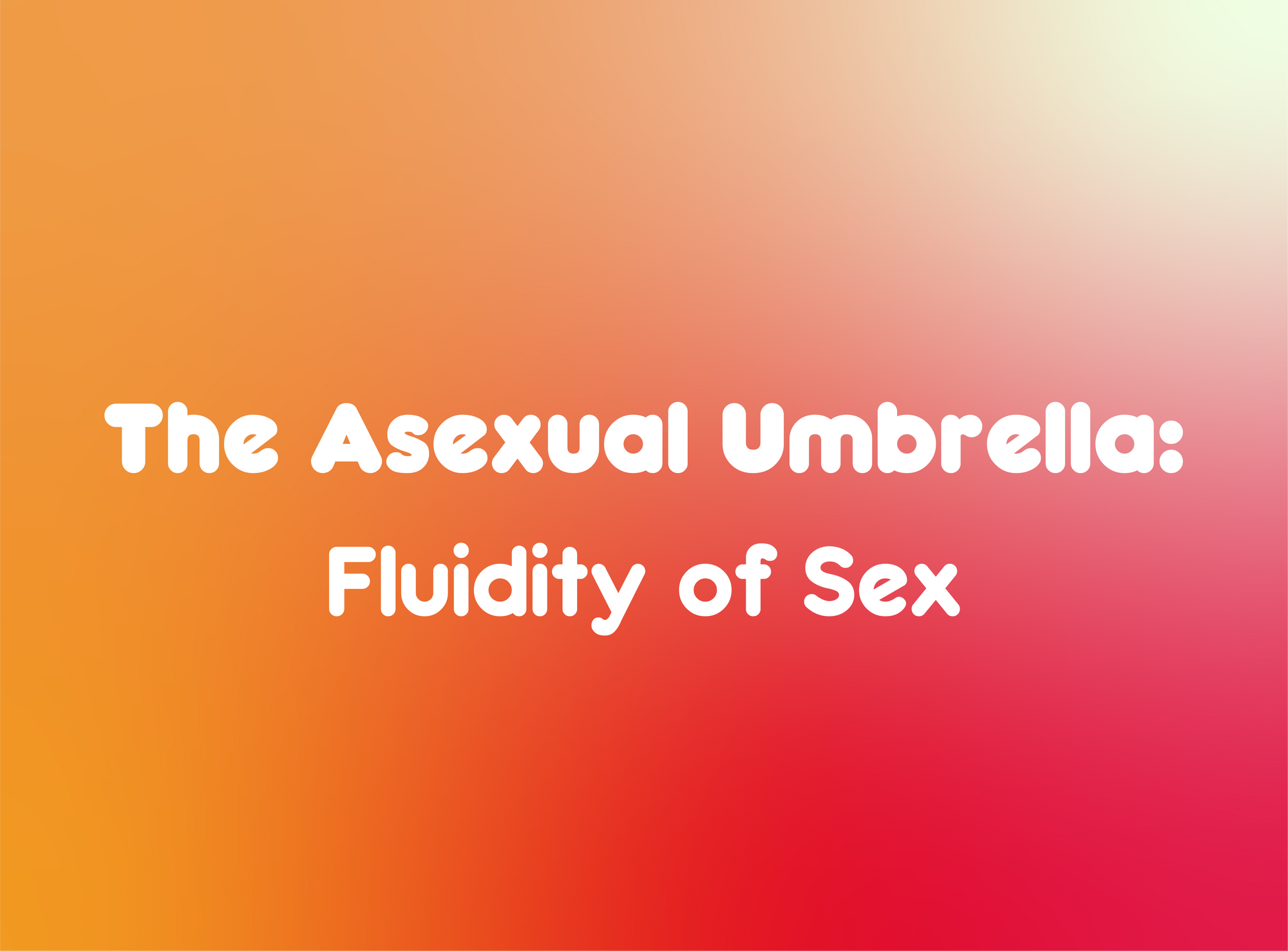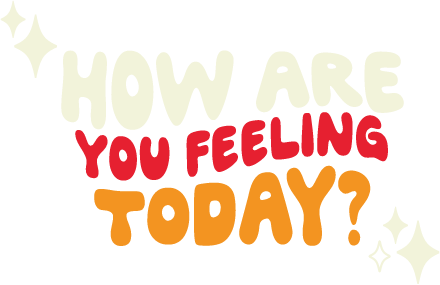
The Asexual Umbrella: Fluidity of Sex
Sex is fluid. Some people want sex, some people don’t. Some people want lots of sex, some people want a little sex. Some people want sex with the same gender and some with different genders. Some want sex with one person, some people want it with lots of people. But this isn't what we’re taught. We live in a world obsessed with categorising every element of sex: when we lose our virginity, how often we have sex, and how many partners we should have. The list is endless. If we’re “too much” of this, we’re labelled, then if we’re “not enough” of that we’re labelled. Sex feels like a competition, and sometimes we can feel a little confused if we don’t quite know where we fit in. So, let’s chat about it.
Sex is a fundamental part of life, there is no debating that. We need it to procreate, and everything today seems to be about sex. Most music is based on sex, and almost every film or TV show features a scene where two people sleep together; it is built into us. As children, we can often separate ourselves from it or find it distanced from us. However, when we become a teenager, this is where suddenly everything is about sex. Our hormones are all over the place, everyone's talking about hooking up, kissing, porn and well, having sex. But what if when all these chats take place, you just can’t relate? Do you have that desire there? Does it simply do nothing for you? Or Do you feel that you don’t want it as much as everyone else, or that you want it more or differently? Maybe you’d rather just get to know someone, maybe you’re not attracted to people physically, but emotionally. Maybe you’d rather just have a cuddle and watch a film than have sex all night. But rarely this is suggested as a viable option.
When we go through sex education (if at all) we are taught the basics. No one tells us about sexualities, we’re just told about genitalia, protection, STIs, pregnancy and periods. And some of us aren’t even told that. Imagine the difference it could’ve made to you growing up if you knew there were others like you out there. That it was normal to just not want sex, that it was normal to want sex with different types of people, and that it was okay to want to change the body we came in. But no one ever did. So, when we reach adulthood we can be left feeling broken, confused and lost.
This can even lead to us thinking there is something medically wrong with us. “What if I have a condition? What if I’m not normal?”. But what even is 'normal'? I remember the first time I learned how many sexualities there were (over 46) and my honest first thought was “that seems ridiculous”. Before you cancel me, I have grown a lot since then and learned why that is. Having various sexual identities helps people feel included and at home. When we grow up, all we know is the binary of 'cisman, ciswoman, the end'. if you’re anything other than that, you feel like an outsider. Being able to identify with alternative sexualities can provide people with a sense of community rather than feeling lost.
One of the biggest frustrations I have is when people say “why do we need all of these labels?!” It’s usually straight people that say this as they often never had to feel out of place with who they are, so they may not understand feeling like an outsider with their peers. Humans have a fear of the unknown and a fear of change, so the second we see something we don’t understand we just seem to ridicule and dismiss it. This is because difference threatens the fabric of our being and makes us question ourselves in uncomfortable ways. Consequently, people act out in defensive and damaging manners, but it can leave those on the receiving end with their self-esteem in tatters.
Often, these people resort to "but why can't people just be who they are without labelling it?". And I completely agree, but it's not that simple. We are not yet in a place to be able to do this. When we grow up in a society where everyone feels seen and heard. When we don't only see cis, white, straight, middle-class people represented positively in the media, then we may get to a point where we can just exist. But we are a long way from that.
I hope that this can be a little safe space for you, a place where there will be no negative reaction to alternatives to the norm. I can’t go through all the sexualities of course, but the focus of this article is the Asexual umbrella and peoples’ differing drives. Firstly, let’s clear up some definitions (ones that I often get mixed up).
Sex drive (libido) - This is the urge to have sex, not necessarily with someone specific, but the general feeling of wanting to ‘relieve’ yourself sexually.
Sexual attraction - This is the urge to have sex with someone specific. When you look at them you get those feelings of wanting to have sex with them, you may even start imagining sexual scenarios quite instantaneously.
Now that they’re out of the way, let’s start talking about more specific sexualities.
Asexual - This is when someone lacks sexual attraction to others or has no active interest in sexual activity. The best analogy of this was from the incredible Sex Education (if you haven’t watched it, I highly recommend it). One of the characters discussing their asexuality said “it’s like I’m surrounded by a huge feast with everything I could want to eat, but I’m not hungry”.
Greysexual - This is the term used for those who experience limited sexual attraction. The reason for its name is that it can be seen as a bit of a ‘grey area’. Many say that it is the middle ground between asexual and allosexual (which is the overarching term used for anyone who experiences sexual attraction). People who are grey sexual may experience sexual attraction, but it tends to be rare and with low intensity. Many who experience this describe the feeling as being indifferent towards sex and just not seeing it as a priority.
Demisexual - This is the term used for those who only experience sexual attraction once an emotional bond has been formed with someone. The actual desire for sex does not arise unless there is a deep bond present, unlike traditional allosexual individuals who may see ‘waiting’ for sex to be more of a preference. For those who are demisexual, it is not a choice, it’s simply how their brain is wired.
Abrosexual - This is also known as sexual fluidity, which is where they may experience differing levels of romantic or sexual attraction throughout their lifetime. This can even mean that they experience a change in sexual orientation altogether, making it all the more confusing for the individual trying to discover their identity. For example, an abrosexual individual may be sexually attracted to men one week, and then not at all a few weeks later. Additionally, there is no set timeline for these feelings; the changes can occur over days or years for some people.
Aegosexual - This term is used for those who lack the desire to be involved in sexual activities themselves, but may still experience arousal to sexual content or fantasies. Some Aegosexuals may still masturbate to sexual content as it is common to experience arousal from the third person with this sexuality but they lack the desire to have physical involvement.
Fraysexual - This is used for those who only experience sexual attraction to those they do not know very well, if at all. By definition, fraysexuals tend to experience a lesser or complete loss of sexual attraction to individuals over time, specifically once an emotional connection is formed.
Aceflux - This is one I had to do some further research into. This is when someone’s sexual attraction fluctuates throughout their lifetime. Sound familiar? It's similar to abrosexual. However, the difference is that an abrosexual's orientation can fluctuate between asexual and allosexual, as well as a fluctuating attraction to different genders, whereas someone who is aceflux tends to experience the same, but with no change in the attraction to genders.
Please let me know if I missed any at all! There were a lot of conflicting resources, so I’ll update it if anything is inaccurate or missing!
I hope this has been informative and may even get you to think about your own identity a little. Just know that whoever you are, whatever you identify as, you are not alone. You are not broken, you are exactly who you were meant to be.
Love,
Max
xoxo
